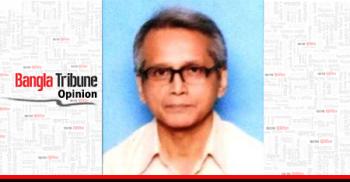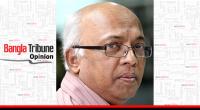 With Bangladesh general elections only weeks away, the Indian media is keeping a close watch on developments in the neighbouring country. Reports on the formation of a united opposition alliance, the BNP’s moves to ensure that its chief Khaleda Zia can still participate in the elections, efforts made by Dr Kamal Hossain to consolidate the opposition — are published regularly. While people in India regard the ruling Awami League and its leader, Prime Minister Sheikh Hasina as being ‘more friendly and approachable’ than the BNP, based on past experience, there has been no explicit media support for any party or group.
With Bangladesh general elections only weeks away, the Indian media is keeping a close watch on developments in the neighbouring country. Reports on the formation of a united opposition alliance, the BNP’s moves to ensure that its chief Khaleda Zia can still participate in the elections, efforts made by Dr Kamal Hossain to consolidate the opposition — are published regularly. While people in India regard the ruling Awami League and its leader, Prime Minister Sheikh Hasina as being ‘more friendly and approachable’ than the BNP, based on past experience, there has been no explicit media support for any party or group.
Yet, political developments in Bangladesh have made a major impact on the functioning of the ruling party in India, the Bharatiya Janata Party (BJP). Initially, some problems developed between the BJP and the Awami League (AL). These followed from the nature of the election campaign in India, where five major states are going to the polls about the same time as Bangladesh, conducted by BJP President Amit Shah.
Shah, in a bid to consolidate Hindu votes, strongly attacked people he described as ‘illegal Bangladeshi immigrants settled in Assam and elsewhere.’ Warning that they would be traced and repatriated, he had addressed a series of rallies all over the country.
Dhaka issued a brief and measured response underplaying the tensions. Bangladesh Information Minister Hasanul Huq Inu said what Shah was saying was ‘not relevant’ and his remarks were ‘improper’. It became very embarrassing for the ruling party and its leader as the opposition gained much political mileage.
But it’s understood in India that the situation changed with the intervention of Prime Minister Narendra Modi himself. He, along with other leaders, reportedly instructed Shah not to refer to the Bangladeshi immigration issue any more. This followed a frantic feedback from India’s Ministry of External Affairs (MEA) mandarins, who pointed out how deeply Bangladesh elections matter to Delhi.
There can be no denying that bilateral relations have never been better between the two countries than at present. Indian observers are concerned that in case the BNP-led formation or other opposition defeat the Awami League, the situation may deteriorate. The opposition in Bangladesh, often dominated by Islamic extremists, never felt comfortable about closer economic ties with India. They opposed plans for a transit treaty and Indian assistance for major projects, suggesting that there would be a ‘security threat to Bangladesh’ from its larger neighbour.
To a great extent the recent economic progress of Bangladesh and the improvement in the standard of living for many people there, has improved the bilateral political narrative, say Indian analysts. Indo-Bangladeshi economic ties have contributed in a major way towards the economic development of Bangladesh, according to analysts.
As a result, there is greater receptivity of Indian views than before among the Bangladesh political circles. People in both countries benefit from bilateral projects seeking to achieve better connectivity, power-sharing and major infra development. India has also reduced the import tariffs on many Bangladeshi goods and extended transit rights to Dhaka by road and water ways, not to mention a large credit on soft terms.
In return, Bangladesh granted India transit rights and cracked down Indian insurgents carrying out their terrorist activities from its soil. It has held its patience on the sharing of Teesta waters. In view of these, it is reported that Prime Minister Modi told BJP chief Shah not to attack Bangladesh over the illegal infiltration issue. His speeches were embarrassing Hasina and the ruling Awami League in a major way, apart from generally offending Bangladesh sentiments.
Existing records show that Shah last spoke critically on Bangladeshi immigrants on Sept 8. Observers pointed out that the BjP too like the Awami League had its electoral compulsions with five major states going to vote. This explained the harsh rhetoric from Shah. Significantly no other BJP leader spoke on the matter.
But after Sept 8, Shah, says one report, has addressed 15 public rallies in Chhattisgarh, Madhya Pradesh and Kerala. But he never referred to the infiltration issue or the NRC exercise in Assam. A major English daily confirms that Shah had been ‘instructed not to refer to such issues’. In the Indian context, this refers indirectly to the authority of Prime Minister Modi.
Now, for a look at a second intriguing development that involves the BNP in Bangladesh.
For some years, it has been standard practice for major political parties in Bangladesh and India to maintain informally, but close relations with each other, without reference to diplomatic protocol. Interestingly, such informal ties were never seen between Indian and Pakistani political parties, the level of hostility being much greater.
The relation between India’s ruling BJP and the BNP have intrigued political observers. Clearly, these parties are as different from each other as chalk and cheese. In fact, their political ideology and orientation are antagonistic, in theory at least.
In common perception, these parties belong to different worlds. The BNP is known for its association with Islamist radical forces in Bangladesh while the BJP in India makes no bones about its links with extreme rightwing Hindu forces. In brief, the BNP is commonly referred to as the anti-Hindu party in Bangladesh while the BJP is known for the anti-Muslim sentiments of its leaders.
Yet, appearances are deceptive. In recent years, the BJP and the BNP had developed an informal communication channel not widely known to the larger public. Among the inner circles in both parties, this communication was maintained by a prominent minister and MP of the BJP, in India. He joined the BJP recently, leaving the Congress, which he had served as an MP.
The gentleman in question is also one of the most successful journalists in India, renowned for setting bold new trends in investigating journalism in the subcontinent.
BJP insiders felt that it did no harm to Indian interests to be on close terms with parties other than the Awami League (AL) in Bangladesh. The BNP as the main opposition party could never be ignored completely by the Indian establishment, after all.
The same was applicable also for Bangladeshi political parties. India being the next door neighbour, it was equally important for AL and BNP leaders not only to develop close links and contacts with the ruling party of the moment but with major figures and groups in the opposition also. “This is the standard operating procedure for politicians in functioning democracies and hardly unusual’ says an analyst.
Thus it caused no surprise when this MP cum Minister, in his visits to Bangladesh met both AL and BNP leaders, including former prime minister Khaleda. Similarly, when BNP leaders visit Delhi, they invariably meet him. In the UK, the gentleman was met regularly by BNP leaders, including Khaleda’s presumed political heir Tarique Rahman. Some claim he seemed more inclined to support the BNP rather than the AL, in the reports that he made to his leaders in the BJP.
The present #MeToo campaign by prominent women figures in journalism, the entertainment industry and elsewhere in India has robbed the BNP of its key champions in India. The gentleman in question currently stands accused of sexually misbehaving with scores of female colleagues during his long career as a professional journalist. Worse, many have chosen to speak out against him in the social media, forcing him to take the defensive legal route — the filing of a defamation case against the first complainant who went public against him.
After holding out initially and refusing to budge, he was persuaded by the ruling NDA leadership to resign from the Council of Ministers, but retaining his status as an MP.
Net outcome — sadly for the BNP he would not be available to act as a valuable contact person in the highest political levels in India with only weeks left for the Bangladesh general elections in December! “Given the close bilateral ties that prevail between not only Bangladeshi and Indian governments and political parties in both countries, the BNP would keenly feel the loss of his guidance and help at a crucial stage of its campaign,” says an analyst.
Ashis Biswas is a Kolkata-based journalist. During his long career, he has worked for the Hindustan Times, Ananda Bazar Patrika, The Hindu and the Outlook magazine. He has been based in New Delhi, Kolkata and the Northeast and worked in West Asia as well.
 Opinion
Opinion
41271 hour(s) 19 minute(s) ago ;
Morning 10:13 ; Wednesday ; Jul 02, 2025
How Bangladesh elections impact Indian politics
Send
Ashis Biswas
Published : 16:53, Nov 17, 2018 | Updated : 18:57, Feb 06, 2019
Published : 16:53, Nov 17, 2018 | Updated : 18:57, Feb 06, 2019
0 ...0 ...
/hb/
Topics: Ashis Biswas
***The opinions, beliefs and viewpoints expressed in this article are those of the author and do not reflect the opinions and views of Bangla Tribune.
- KOICA donates medical supplies to BSMMU
- 5 more flights to take back British nationals to London
- Covid19: Rajarbagh, Mohammadpur worst affected
- Momen joins UN solidarity song over COVID-19 combat
- Covid-19: OIC to hold special meeting
- WFP begins food distribution in Cox’s Bazar
- WFP begins food distribution in Cox’s Bazar
- 290 return home to Australia
- Third charter flight for US citizens to return home
- Dhaka proposes to postpone D8 Summit
Unauthorized use of news, image, information, etc published by Bangla Tribune is punishable by copyright law. Appropriate legal steps will be taken by the management against any person or body that infringes those laws.
Bangla Tribune is one of the most revered online newspapers in Bangladesh, due to its reputation of neutral coverage and incisive analysis.
F R Tower, 8/C Panthapath, Shukrabad, Dhaka-1207 | Phone: 58151324; 58151326, Fax: 58151329 | Mob: 01730794527, 01730794528


